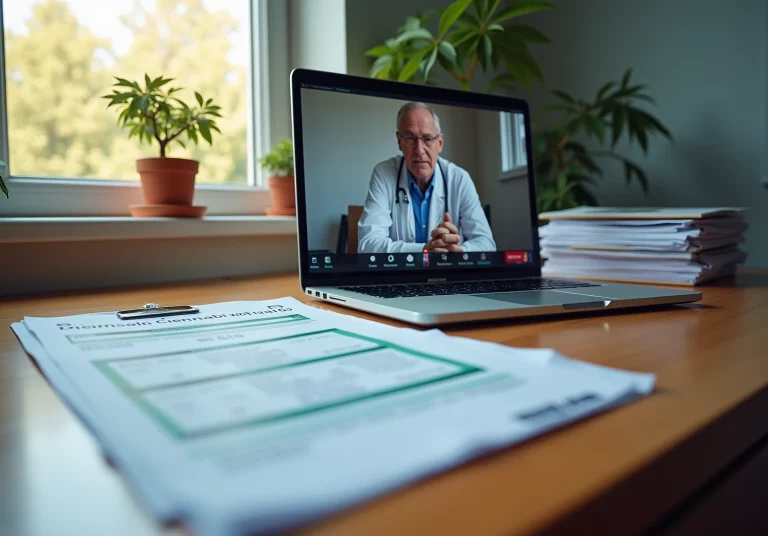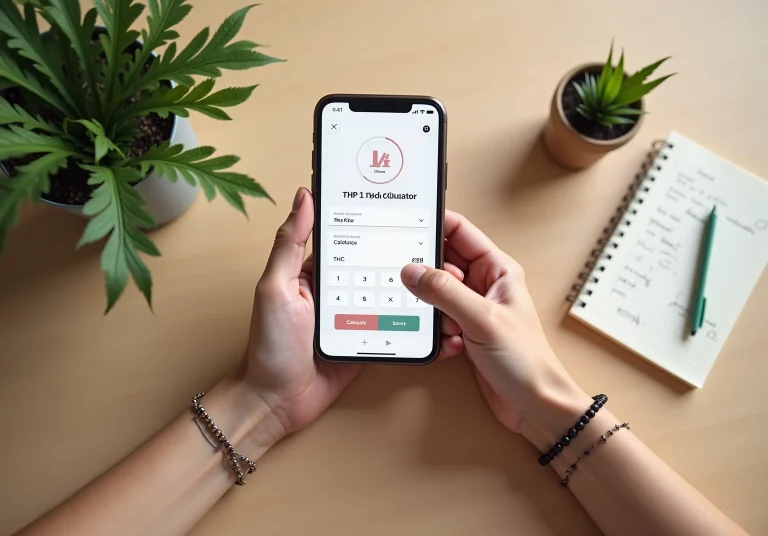What to Expect During a Medical Marijuana Consultation with a Doctor
by Haley Mills · July 20, 2023
Prepare for your medical marijuana consultation with our guide. Learn what to expect during your visit and how to talk to your doctor about using cannabis for treatment.

As medical marijuana increasingly becomes a viable treatment option for various health conditions, it is crucial to understand the process of acquiring it legally. With services like Leafy DOC, this process is streamlined and accessible. In this article, we aim to walk you through every stage of your journey, from understanding the pivotal role of medical marijuana doctors to acquiring your own medical marijuana card. Additionally, we’ll explore how Leafy DOC simplifies this process, making it a preferred choice for many seeking alternative treatment options.
An Overview of the Medical Marijuana Consultation Process
Starting your journey toward medical cannabis therapy often begins with a consultation. This process typically involves a detailed discussion with a certified physician to evaluate your condition and discuss potential treatment plans. Patients usually provide their medical history and discuss current symptoms. The doctor then determines if medical cannabis could be a suitable treatment.
Understanding the Role of Medical Marijuana Doctors
Medical marijuana doctors are not ordinary physicians. They possess in-depth knowledge about the therapeutic potential of cannabis and are authorized to recommend it as a form of treatment. MMJ doctors assess a patient’s condition, certify patients for MMJ use, and guide them on appropriate strains, dosages, and consumption methods, ensuring a personalized and effective treatment plan along with their medical card.
Identifying Qualified Candidates for Medical Cannabis Treatment
Identifying qualified candidates for medical cannabis is one of the critical roles of a medical marijuana doctor. Eligibility varies by state, but chronic pain, epilepsy, glaucoma, cancer, PTSD, and inflammatory bowel diseases are often qualifying conditions. The doctor (in person or telehealth) comprehensively evaluates the patient’s condition, medical history, and overall healthcare goals before making a recommendation.
Educating and Guiding Patients: The Doctor’s Role
Apart from prescribing medical cannabis, doctors also educate patients on safe and effective use. They discuss various strains of cannabis, methods of consumption, and possible side effects. This guidance enables patients to make informed decisions about their health and helps ensure they use medical cannabis responsibly and effectively.
How to Acquire a Medical Marijuana Card
Getting a medical marijuana card typically involves a few steps. First, a patient consults with a certified MMJ doctor, who evaluates the patient’s medical conditions. If suitable to receive medical marijuana, the doctor provides a recommendation via a written certification. It’s important to remember that qualifying conditions vary from state to state.
Then, the patient uses this recommendation to register with their state’s medical marijuana program. Once the state approves the registration, the patient receives their medical marijuana card and can then legally purchase cannabis products approved in their area, even if recreational users aren’t allowed in the area.
Choosing the Ideal Form of Medical Cannabis: How a Doctor Can Help
Choosing the right form of medical cannabis is a critical step in the treatment process. Medical marijuana doctors guide patients to select from various forms such as flower, edibles, tinctures, and topicals. The choice often depends on the patient’s condition, lifestyle, and personal preferences.
- Smoking: This is the most common method of consuming cannabis. The dried flower buds of the cannabis plant are rolled into a joint or packed into a pipe, bong, or another smoking device. The cannabis is then lit, and the smoke is inhaled. Smoking allows for quick onset of effects as the active ingredients are rapidly absorbed into the bloodstream via the lungs.
- Vaporizing: Vaporization is a smokeless method of inhalation. Using a vaporizer, the cannabis is heated to a temperature that causes the active ingredients (THC, CBD) to vaporize without burning the plant material. Vaporizing is a healthier alternative to smoking as it produces fewer harmful substances.
- Edibles: Cannabis can be infused into food or drinks. These are called edibles and come in various forms, such as cookies, gummies, brownies, teas, and more. The onset of effects from edibles is slower (up to two hours) as they need to be digested and metabolized in the liver, but the effects can be stronger and last longer.
- Tinctures are liquid cannabis extracts typically administered under the tongue (sublingually). They are quickly absorbed into the bloodstream, providing rapid onset of effects. Tinctures offer a discreet and easily controllable method of consumption.
- Topicals: Cannabis-infused creams, lotions, balms, or oils are applied directly to the skin for localized relief. Topicals are often used for conditions such as arthritis, inflammation, or skin conditions and do not usually produce psychoactive effects.
- Capsules: Similar to edibles, cannabis can be consumed as capsules. The capsules contain a specified amount of cannabinoids, providing a convenient and consistent dosing method. Like edibles, the onset of effects is slower due to digestion.
- Dabbing involves inhaling the vapor produced by heating highly concentrated forms of cannabis known as dabs. Dabbing can be potent and isn’t typically recommended for beginners.
- Transdermal Patches: These are adhesive patches that are applied to the skin. They slowly release cannabinoids into the body over a period of time. Transdermal patches can provide long-lasting relief and suit medical patients needing sustained dosing.
The Importance of Follow-Up and Continuous Monitoring
Medical marijuana treatment isn’t a ‘one-size-fits-all’ solution. Follow-ups are crucial for adjusting dosages and strains and addressing potential side effects. Continuous monitoring allows the doctor to ensure the ongoing effectiveness and safety of the treatment, adjusting the course of therapy as required.
Staying Up-To-Date: The Latest in Medical Cannabis Research
Medical cannabis research has advanced significantly in recent years, and medical marijuana doctors strive to keep abreast of these latest developments. This knowledge enables them to make well-informed recommendations and provide the most effective treatments for their patients.
- Cannabis and Pain Management: Several recent studies have explored cannabis as a potential treatment for chronic pain. A study published in the European Journal of Pain demonstrated that patients with chronic pain who used cannabis experienced a significant reduction in their symptoms. Importantly, this improvement was noted without causing a significant increase in adverse side effects.
- Cannabis and Neurological Disorders: Recent research has also shown promising results in using cannabis for neurological disorders. A 2022 study in the Journal of Neurology found that medical cannabis may reduce spasticity and pain in patients with multiple sclerosis.
- CBD and Anxiety: CBD, one of the main components of cannabis, has been studied for its potential in treating anxiety. A 2022 study published in The American Journal of Psychiatry found that CBD could effectively treat generalized anxiety disorder. This study is pivotal as it indicates the potential of non-psychoactive components of cannabis in treating mental health conditions.
- Cannabis and Cancer: The potential role of cannabis in managing cancer symptoms and treatment side effects has been a significant focus of recent research. A study from The Oncologist Journal in 2021 found that cannabis might help manage pain and nausea in cancer patients undergoing chemotherapy.
- Cannabis and PTSD: A study published in the Journal of Psychopharmacology in 2022 found that PTSD symptoms in patients who used cannabis were significantly reduced.
While these studies represent significant strides in medical cannabis research, it’s crucial to remember that cannabis affects everyone differently. Applying these findings to individual treatments should always be overseen by a knowledgeable medical marijuana doctor. The field of medical cannabis is dynamic and ever-evolving. As more researchers gain access to study marijuana for medical problems, the potential benefits of medical cannabis will continue to become clearer.
Navigating Legal Considerations with a Medical Marijuana Doctor
Understanding the legal landscape of medical marijuana is crucial. Medical marijuana doctors are well-versed in state-specific laws and regulations regarding possession limits, qualifying conditions, and cultivation rights. They guide patients through these legal intricacies, ensuring compliance and minimizing legal risks.
Advocating for Medical Cannabis Accessibility: Doctors at the Forefront
Medical marijuana doctors often advocate for easier access and broader acceptance of medical cannabis. They engage in community education, professional collaboration, and policy discussion to destigmatize medical cannabis and integrate it into mainstream healthcare.
Medical Marijuana (MMJ) doctors play a crucial role in advocating for medical cannabis use and the rights of their patients. Here are a few ways they can do so:
- Educate the Public: One of the primary ways MMJ doctors can advocate for medical cannabis use is by educating the public about its benefits and dispelling common misconceptions. This can be done through public forums, community events, articles, social media, and more.
- Inform Policy: Doctors can provide expert advice and testify at legislative hearings to help shape policy surrounding medical cannabis use. They can share real-world experiences and evidence-based information to inform lawmakers about the medical benefits of cannabis.
- Research and Publish: By conducting and publishing research on the efficacy and safety of medical cannabis, doctors can contribute to the scientific literature that supports its use. Publishing case studies of successful treatments can also help in raising awareness about the therapeutic potential of cannabis.
- Patient Advocacy: Advocacy for patients is also critical. This can mean helping patients navigate getting a medical marijuana card, working with insurance companies to cover medical cannabis treatments, or defending their right to use medical cannabis in settings where its use might be frowned upon or misunderstood.
- Training and Education for Other Medical Professionals: Many healthcare professionals are still unaware of the benefits and usage of medical cannabis. MMJ doctors can provide training and educational resources to their peers, expanding the network of physicians who are knowledgeable and supportive of medical cannabis treatment.
- Collaboration with Dispensaries: MMJ doctors can collaborate with dispensaries to ensure they provide high-quality and appropriate products for various medical conditions. This relationship can also help offer educational materials and workshops for patients at the dispensaries.
- Involvement in Professional Organizations: Participation in professional organizations related to cannabis medicine, like the International Cannabinoid Research Society or the American Cannabis Nurses Association, can give physicians a platform to advocate for research, clinical practice, and policy changes.
Why Choose Leafy DOC for Your Medical Marijuana Consultation
Leafy DOC simplifies the process of acquiring a medical marijuana card. Leafy DOC provides a seamless, efficient, and patient-friendly experience, from easy online booking to virtual consultations with licensed physicians. It also offers a money-back guarantee if you don’t get approved.
How to Book Your Appointment with Leafy DOC
Booking an appointment with Leafy DOC is as easy as a few clicks. Visit their website, fill out the intake form with your personal details and ID, and book your telehealth appointment conveniently. This approach allows you to skip the traditional waiting room experience, creating a comfortable and efficient process.
Finding the Right Licensed Marijuana Doctor
Leafy DOC ensures you connect with the right medical marijuana doctor for your needs. After submitting your intake form, you’ll be matched with a licensed physician who can answer your questions, address your concerns, and evaluate your qualifying condition in a friendly, professional manner.
Securing Your Medical Marijuana Card
Once you have a recommendation from a Leafy DOC physician, they will guide you on the next steps to register with your state’s medical marijuana program. The seamless collaboration between Leafy DOC and state programs accelerates the approval process, allowing you to receive your medical marijuana card either by mail or as a downloadable patient ID card.
Trusted by Thousands: Leafy DOC’s Track Record
With its commitment to privacy, convenience, and quality care, Leafy DOC has become a trusted provider for thousands of patients seeking medical marijuana products. The platform’s HIPAA-compliant processes, the convenience of on-demand telehealth appointments, and the 100 % money-back guarantee policy, if not approved for a medical cannabis card, have cemented Leafy DOC’s reputation as a reliable, patient-focused service.
Harnessing the Therapeutic Potential of Medical Cannabis
Navigating the realm of medical marijuana may seem daunting, but with the right guidance from medical marijuana doctors and services like Leafy DOC, this process can be made significantly easier. By arming yourself with knowledge and understanding of this treatment option, you can harness the therapeutic potential of medical cannabis to manage various health conditions effectively and legally. Remember, your journey with medical marijuana is personal, and the most crucial aspect is to find a regimen that works best for you under the careful guidance of a medical professional.
Last Updated: January 29, 2025
Get Approved for Your Medical Marijuana Card in Minutes!

Get Your Medical Card
Connect with a licensed physician online in minutes

Like This Article?
Share with your friends
Table of Contents
Keep Reading
-
Marijuana Card Renewal: Step-by-Step Process and Solutions
Navigate the marijuana card renewal process with ease using our step-by-step guide.
-
Why Are My Weed Plants Turning Yellow?
Is your weed plant turning yellow? Learn the ultimate solution to vibrant green marijuana plants and how to fix it now! Don’t miss out on this must-read guide. Click here for expert tips!
-
Master the THC Calculator Flower: Step-by-Step Guide
Master the THC calculator flower for precise dosage management in medical marijuana use.



